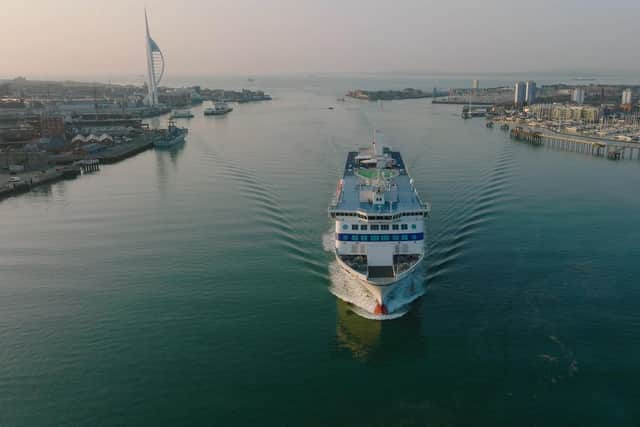Portsmouth International Port: 'Game changing' £20m funding boost for new power systems at port
and live on Freeview channel 276
The new system will cover the port’s three busiest berths and allow ships to rely on a land-based power supply rather than relying on leaving their engines on. The funding comes ahead of the arrival of two hybrid ships from Brittany Ferries which are due to begin sailing in the spring of 2025 and will be able to make use of shore power.
Shore power is one of the most significant hurdles facing ambitions for the city council-owned port to become the first net carbon neutral port in the country by 2030.
Advertisement
Hide AdAdvertisement
Hide AdThe Sea Change project has been designed by the council in conjunction with Brittany Ferries, the University of Portsmouth, MSE International, B4T, IOTICS and Swanbarton.


Funding will come through the £19.8m award from the government’s Zero Emissions Vessels and Infrastructure competition.
Councillor Gerald Vernon-Jackson, whose cabinet role includes responsibility for the port, welcomed the announcement.
“Improving air quality is one of the most pressing issues facing Portsmouth today,” he said. “Across the council we’re undertaking a huge range of projects to combat harmful emissions, which includes already approving a massive upgrade of the electricity supply to the port so this project can happen.
Advertisement
Hide AdAdvertisement
Hide Ad“It’ll also bring new high-skilled jobs and investment to the city, so I’m delighted we can now deliver this for the people of Portsmouth.”
Christophe Mathieu, the CEO of Brittany Ferries, said the technology would “fully unlock the potential” of its two new vessels, describing the council as a “forward-thinking partner”.
Recent efforts to improve the port’s climate credentials have included the installation of 2,660 solar panels across the site. These can produce about one-third of its electricity demand.
Port officials said Portsmouth International Port was now “a living laboratory of green technology with industry-leading sustainability credentials”.
Advertisement
Hide AdAdvertisement
Hide AdThe council has estimated that the new shore power system will save the equivalent of 20,000 tonnes of carbon dioxide emissions a year from 2027.
“Once delivered, this revolutionary multi-user, multi-berth shore power facility will be a UK first,” the port’s technical director, Stephen Watkyns, said. “It means we’ll be able to provide shore power for ships on three of our berths, including providing power for the hybrid Brittany Ferries ships coming in 2025.
“This project is another huge step forward for our ambitions to reach net carbon neutral by 2030 and eliminate emissions by 2050.”
The University of Portsmouth has supported the project through its expertise in data science and smart power grids while the other organisations involved have designed sensors and software needed to control the system.
Advertisement
Hide AdAdvertisement
Hide AdAssociate professor in environmental innovation David Hutchinson said he was “proud” of the university’s involvement.
“Sea Change underscores the critical importance of the university and city joining forces to combat climate change,” he said. “This collaboration not only strengthens our resolve to address the pressing challenges of our era but also showcases the profound impact that unity and innovation can have on our shared commitment to a sustainable future.”
The Zero Emissions Vessels and Infrastructure competition was confirmed in February 2023. The 10 “clean maritime solutions” announced today (Monday, September 11) will share just over £80m.